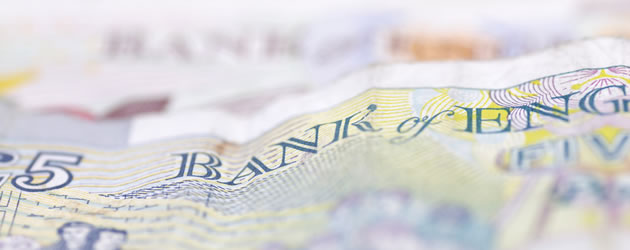
Pound Sterling exchange rate movement has been a bit static so far this week due to a comparative lack of UK data. Sterling movement registered over the last few days has largely been the result of global events. Sterling has softened against currencies such as the US Dollar (GBP/USD) as UK involvement in the current Syria conflict becomes uncertain. Whilst the UK government decides on future action in Syria, investors risk appetite weakens and lends favour to safe-haven currencies. At present the Pound is trading at 1.6356 versus the ‘Buck’ ahead of Thursday’s speech from Bank of England Governor (BoE) Mark Carney.
Last week saw Scottish referendum fears alter the Pound exchange rate. However, this week focus returns to the possibility of higher borrowing costs. Carney could inspire a rally in the Pound if he delivers an optimistic speech regarding interest rate hikes in the UK. Whilst increased borrowing costs have been speculated about for some time and the Bank of England has yo-yoed in terms of their time frame, many economists believe that the first quarter of 2015 could see the UK be the first of the Group of Seven to hike interest rates since the global financial crisis.
Industry expert Ian Winship stated: ‘We agree with February in terms of the date. It’s fair enough distance from the general election to be a political issue and you’ll also have had the February inflation report. In terms of market pricing, there’s about 65% probability of a 25 basis point rise price in. The focus after that will be the trajectory of policy normalisation.’
However, any gains made by the Pound against the US Dollar in the near future may be limited as the UK undergoes major changes to the government system following the Scottish referendum. Advances against the ‘Buck’ may only be fleeting as the possibility of devolution in the UK become more prominent. Forex expert Lee McDarby stated: ‘The Scottish referendum has now passed and despite the “No” vote it raises questions around similar votes in the future and devolution. Despite the fall in foreign-exchange volatility after the referendum, we have seen uncertainty regarding the Pound with added interest on the general election in 2015. In the short-term, it looks like Sterling will step away from the limelight.’
However, the Pound is currently trading just shy of a two-year high against the Euro (GBP/EUR). The Pound has reached session highs of 1.2792 on Wednesday as the Eurozone economy adjusts to the latest European Central Bank (ECB) measures. ECB President Mario Draghi appears to be behind in his goal to increase inflation within the Euro area, a serious issue for the 18-nation economy. Draghi recently cut interest rates to a shocking low of 0.05% and announced that the ECB would be purchasing private sector assets. Inflation in the Eurozone has been persistently low for the last 11 months, with consumer price growth remaining below 1%. Goldman Sachs representative Huw Pill commented: ‘Draghi is creating a dynamic which empowers him. He could be backed into a corner but we know that he is at his most powerful when backed into a corner.’
Draghi then announced the ECB would be offering cheap money to Eurozone banksin an effort to offer more loans to small businesses. The so-called Targeted Long Term Refinancing Operation was expected to prove popular but the banks didn’t take the bait and lending in the Eurozone remains low. Draghi has since instilled some confidence by stating that he and the ECB are prepared to use any ‘tools at its disposal’ to encourage growth in the Eurozone.
Meanwhile, the Sterling exchange rate has been trending lower against the Australian Dollar (GBP/AUD) on Wednesday. Although the Pound has been trading amid a quiet week of domestic data publications, Tuesday’s weak UK figures have enabled other currencies to gain against Sterling. UK Loans for House Purchases fell to a twelve month low on Tuesday, with only 41,588 applications approved.
However, Thursday will see Reserve Bank of Australia (RBA) Governor Glenn Stevens make a statement at the Melbourne Economic Forum which could alter the ‘Aussie’ exchange rate. In recent months the Australian Governor has attempted to jawbone the currency lower and more dovish rhetoric could be expected on Thursday.
Pound Sterling Exchange Rate Forecast
In the last half of the week, the Pound will mostly be reliant on developments in the Syria conflict as well as Governor Carney’s speech on Thursday. By way of domestic data, CBI Reported Sales figures are scheduled for release on Thursday, followed by Average Weekly Earnings. Friday will see only one piece of data published, the Hometrack Housing Survey, which will give an indication of the current health of the UK housing market.
UPDATE
Although the Pound spent Wednesday struggling against peers like the US Dollar and Australian Dollar, the British currency was able to rebound against the ‘Aussie’ after the Melbourne Economic Forum.
At the forum RBA Governor Glenn Stevens asserted that the central bank might bring in measures to rein in the nation’s overheating housing sector. The GBP/AUD exchange rate accordingly gained by more than 0.4%.
However, while the Pound was also stronger against the Euro, the GBP/USD exchange rate remained trending lower ahead of today’s run of potentially influential US reports.

